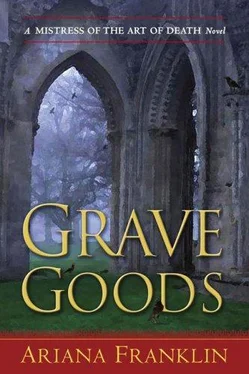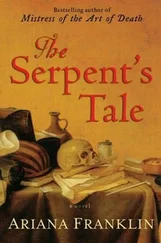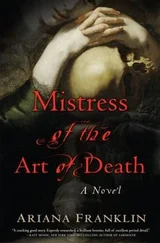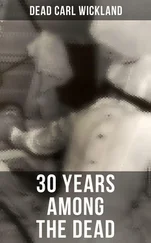She felt a ferocious protection for the woman this had been; the skeleton was so… so dainty. Perfect little teeth grinned up at her, slender hand and finger bones lay quietly on the catafalque, as if the appalling infliction on the lower body no longer mattered.
Which it probably didn’t-not to her.
It mattered to Adelia.
At the sound of footsteps outside, she shot through the door, swearing in Arabic, ready to berate any damned monk in her path. But it was Gyltha and Allie waiting for her.
“Come and see this…” Adelia began, and then stopped. There was a look on Gyltha’s face.
“We been up there.” Gyltha jerked her head toward the upper pasture without taking her eyes off Adelia’s. “We went to see the mule.”
“Oh, yes?”
“An’ she started to cry.” Another jerk of the head, this time down at Allie. “Said she was sorry as how she’d been nasty to little Pippy, and why wouldn’t he come and see her.”
“Yes?”
“An’ I said, ‘We’ll find him, pigsy. Him and his mama’ve been held up on the road.’ And she said, ‘No, he’s here. That’s his pet mule.’ An’ I said, ‘Can’t be.’ And she said…”
Adelia crouched down to put herself on a level with her daughter. “Why do you think it’s Pippy’s mule, darling?”
“ ’Cos it is,” Allie said. Tears were still on her cheeks. “It’s Poly-carp. Pippy used to like him best of all because he could feed him and he didn’t bite like the others.”
“How do you know it’s Polycarp?”
“ ’Cos it is,” Allie said again. “He’s got a nick in his ear and a bit of rain rot on his rump-like a strawberry patch. Wilfred said they would put seaweed on it.” She cheered up. “Just near his arse.”
“You’re sure?”
“It’s Polycarp.” Allie was getting irritated with the interrogation.
Adelia looked up to meet Gyltha’s eyes.
“She ain’t never wrong when it comes to animals,” Gyltha said.
“No,” said Adelia slowly. “No, she isn’t. Oh, dear God.”
I THINK BROTHER PETER bought the animal for us at Street’s market,” Abbot Sigward said cautiously. “We shall ask him.” He called to the man who was still scything the top pasture, beckoning for him to come down.
“Our stables went up in the fire, you see,” he told Adelia. “All our horses burned to death.” He put a hand to his eyes as if shielding them from a sight too awful to remember. There was a general shudder from the other monks. “After that a mule was all we could afford.”
“Useless,” Hilda muttered. “He’s to blame. Them was Brother Aloysius’s last words. ‘Eustace, Eustace.’ Heard him myself as I was putting the salve on his poor burns.”
“They were not as distinct as that,” the abbot told her patiently. “May God bless him, but we cannot rely on the incoherence of a dying man.”
Nor, it seemed, on the word of an agitated woman and her four-year-old child. The monks thought Adelia was deluded. The abbot was trying to placate her; the others were impatient to hear the lord Mansur’s verdict on the bones.
But for her, Arthur and Guinevere could stay dead; it was the living she was concerned with now-God only grant that Emma and the others were living.
“A mule’s a mule,” Brother Aelwyn said waspishly. “Who can distinguish between the brutes?”
Not me, thought Adelia, who had difficulty telling a charger from a palfrey. But Allie can.
She’d taken her daughter up to the pasture with Mansur and Gyltha and listened as the child pointed out the marks that, to her, set a grumpy-looking quadruped apart from all other horseflesh-and had been convinced Emma and the others had been attacked, their goods taken and sold.
“We’ve got to find them,” Adelia said. “We’ve got to find them.”
She couldn’t rid herself of the feeling that they were somewhere near and in terrible need. The call of a blackbird was the voice of Emma pleading for her life; the faraway eeyah, eeyah shriek of a hen harrier quartering the marsh was the scream of young Pippy.
Coming back down, she’d challenged the monks emerging from holy offices, demanding to know where they’d acquired the beast.
It was possible, of course-as the abbot pointed out-that Emma had sold her mule train before settling down somewhere in the vicinity.
Adelia didn’t believe it. Her friend had certainly not settled down at Wolvercote Manor if the dowager Lady Wolvercote was to be believed. Also, the arrival of a grand lady like Emma in the neighborhood would surely have caused a stir among the locals, yet none of them-here in Glastonbury, at least-seemed to have heard of it.
“Brother Peter will know,” Abbot Sigward said, relieved to see the man approaching. “He’ll clear the matter up.”
Brother Peter was another shock. He wore the habit of a lay brother that showed him to be basically a monastic laborer, but his height, coloring, and features were those of the man Adelia had seen baking bread in the kitchen of Wolvercote Manor only yesterday.
After a moment, she knew he couldn’t be-the baker hadn’t had this one’s tonsure, though the hair was otherwise the same-but he was his twin, she was sure of that.
Interrogated, he became defensive. “What I done wrong now, then? I says to you, Abbot, as we needed summat to pull a plough and harrow. Get it, says you, but get it cheap.”
“So I did, so I did,” Abbot Sigward said. “Nobody is blaming you, my son. But where did you get it?”
“Street. Where else? There ain’t a market here no more. Bought him at Street. Picked that un acause he’s strong for all he’s got rain rot.”
“Seaweed,” Allie piped up. “That’s the thing for rain rot.”
“Oh, yes,” Brother Peter said sarcastically, regarding the child with the same truculence he was according everybody else. “I got a lot o’ time to poultice a mule’s rump with blasted seaweed, o’course I have.”
“But who sold it to you?” Adelia asked.
It was no good. A mule seller, a man who went from market to market and turned up at Street’s every couple of months. Brother Peter had bargained with him, bringing the animal’s price down to what the abbey could afford. “Didn’t know I had to ask its blasted ancestors, did I?”
“When was this?”
“Near a month ago,” Brother Peter said. “Saint Boniface Day. And now, if there ain’t no more questions, I got hay to cut.”
Abbot Sigward looked inquiringly at Adelia, who shook her head, and Brother Peter stumped off.
“A rough diamond, I’m afraid,” the abbot said, “but a good Christian and a hard worker.”
SHE WAS GOING to have to speak to the man alone. She was going to have to do a lot of things-and do them quietly. Innocence had departed from this sunny day. The abbey’s people, the gibbering Brother James, Aelwyn with his antagonism, the obese Titus, even Hilda, even the lovely abbot, had suddenly become sinister. She remembered Captain Bolt: “Something’s gone out of this place and something else has come in.”
Gathering herself, she said, “The lord Mansur requires more time before he can make any decision about the bones.” Then she bowed to the abbot and walked away.
AT FIRST she couldn’t eat her dinner, though Godwyn had stewed venison with wine and mushrooms until it fell off the bone.
Where to go for help? To the county sheriff? But would he give her concern for Emma any more credence than the monks had? Unlikely. Not until she had more evidence. He would take the line that Emma had a perfect right to have changed her mind about their rendezvous and sell her mules.
Rowley?
No. Please, God, don’t force me to that. We are severed, and it nearly killed me. Days can go by now-well, hours anyway-when I’m not thinking about him. He probably doesn’t think of me at all.
Читать дальше












